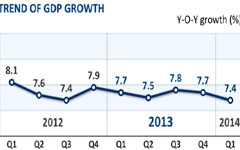Government unveils strategy it will use to achieve wealthier World Bank status
China will strive to reach the "high-income club" by 2020, a senior official said on Wednesday.
Speaking at a news conference to announce the beginning of work on the 13th Five-year Plan (2016-20), Xu Lin, director of the department of development planning of the National Development and Reform Commission, said the government hopes implementing it will allow China to approach the high-income threshold under the World Bank's standard.
 |
 |
The World Bank classifies countries by their per capita gross national income. Countries with a per capita GNI of more than $12,616 are categorized as high-income countries.
With a $5,720 per capita GNI in 2012, China is categorized as an upper-middle-income country by the World Bank. The figure for 2013 is not available yet. China's per capital gross domestic product in 2013 was about $6,800.
This is the first time the Chinese government has announced a timetable for raising its income status. Previously, it set a target of becoming a "moderately well-off society" by 2020. But that is a vague concept that is poorly understood in the West. At a key conference in 2012, the Communist Party of China pledged to double its GDP and per capita income by 2020 from its 2010 figures.
International experience, however, showed it to be a rough, if not turbulent, journey to make that leap.
Except for a few small economies, only Japan and the four "Asian tigers" (South Korea, Taiwan, Hong Kong and Singapore) have made their way into the high-income club over the past 30 years.
Many Latin American countries became upper-middle-income countries as early as the 1960s and '70s, but they are still knocking at the "high-income" door.
The phenomenon is so entrenched that the World Bank coined the term "middle-income trap", in which rising economies lost their traditional advantages in labor and land cost, and failed to get new advantages with which to enter the higher echelon. Many economists doubt whether China, facing the same challenges, could break out of that trap.
